Self Help Africa/ Irish Aid Science for Development Award at BTYSTE 2020
News
20 January 2020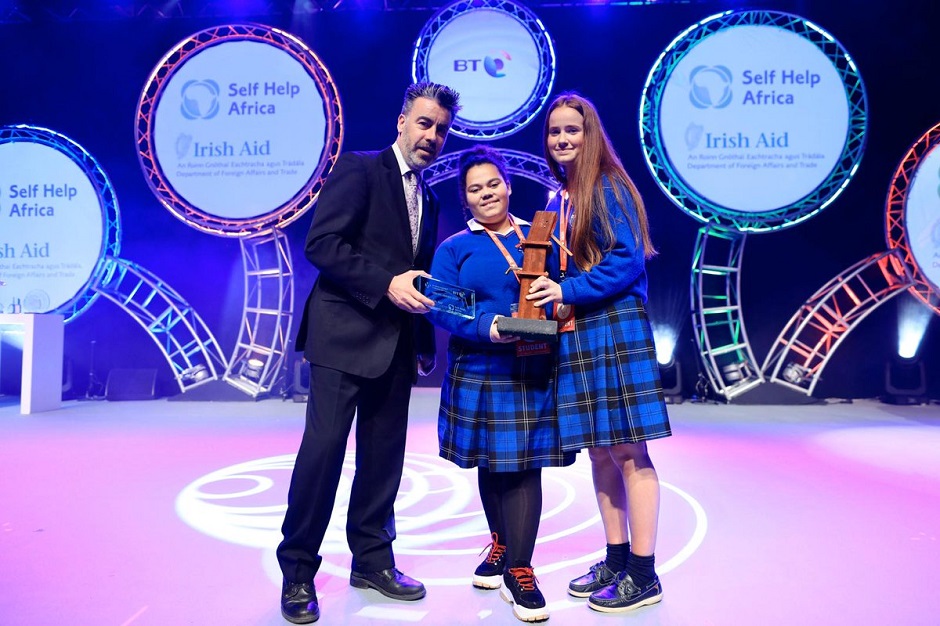
DG Ruairí de Búrca, presents the award to Salome Maher Bordalo and Sophie McElligott from St. Joseph’s Mercy Secondary School, Navan (Credit: Julien Behal Photography)
The 2020 Science for Development Award winners at BT Young Scientist and Technology Exhibition are Salome Maher Bordalo and Sophie McElligott of St. Joseph’s Mercy Secondary School, Navan with their project called Period.. The students are concerned that many girls, especially in poorer countries, miss school during their periods because they do not have access to feminine hygiene products. They firmly believe that all girls should have access to quality education and that periods should not be a bar to this. They were inspired to create an ethical period product which would be cheap and easy to produce but which would also have minimum effect on the environment. As their school has historic links with the Mercy Sisters in Zambia, the girls considered how this product might be produced in that country. Cotton is produced locally in Zambia so the materials for their sanitary products could be easily and cheaply sourced there. The product would be biodegradable and compostable, making it an excellent product for use in Ireland also, as an average tampon can take a lifetime to decompose. As part of their prize, the girls and their teacher, will participate in a Self Help Africa schools visit to Africa in early 2021, where they will present their project and research and possibly further develop their project. This project also came third in the technology group category at Intermediate level.
This is the fifteenth year that Irish Aid has funded the €6,000 travel bursary which is awarded to the winning project and which aims to encourage teachers and students to develop ideas, using appropriate scientific technology, that may prove useful at local community level in the Global South. The aim is to give students a greater insight into the wider world, and their role as global citizens. The award is adjudicated entirely independently by the judges at the annual BT Young Scientist Exhibition. The judges look for evidence that the students have made the link to the global, and seen how our challenges are global challenges which require global solutions. When facing these challenges, it is people with fewer resources who suffer most and projects are encouraged that have taken this into consideration.
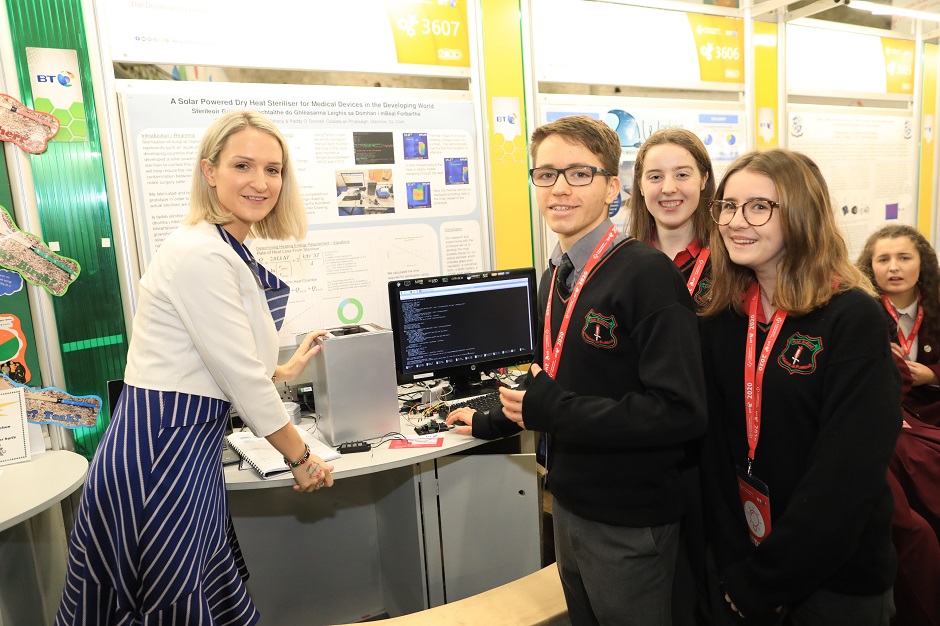
Coláiste an Phiarsaigh students demonstrate their steriliser to Minister Helen McEntee (Credit: Julien Behal Photography)
This year there were 550 exhibits displayed in the RDS, submitted by 1,100 students representing 244 schools across the island of Ireland. Of the five hundred and fifty projects this year, three hundred and thirty-five explored climate change and environmental issues, proof that our young people are determined to deal with these challenges head on. In his address at the opening ceremony, An Taoiseach Leo Varadkar, praised the young scientists present. He said:
“This event gives me hope. It gives me confidence that the future of our country and the future of our planet is bright. The greater the challenge, the greater the response. Climate change, gender equality, a better society –the challenges of our century are driving your biggest ideas……. I encourage you to keep innovating, to keep creating and to keep using your imagination to create a better world.“
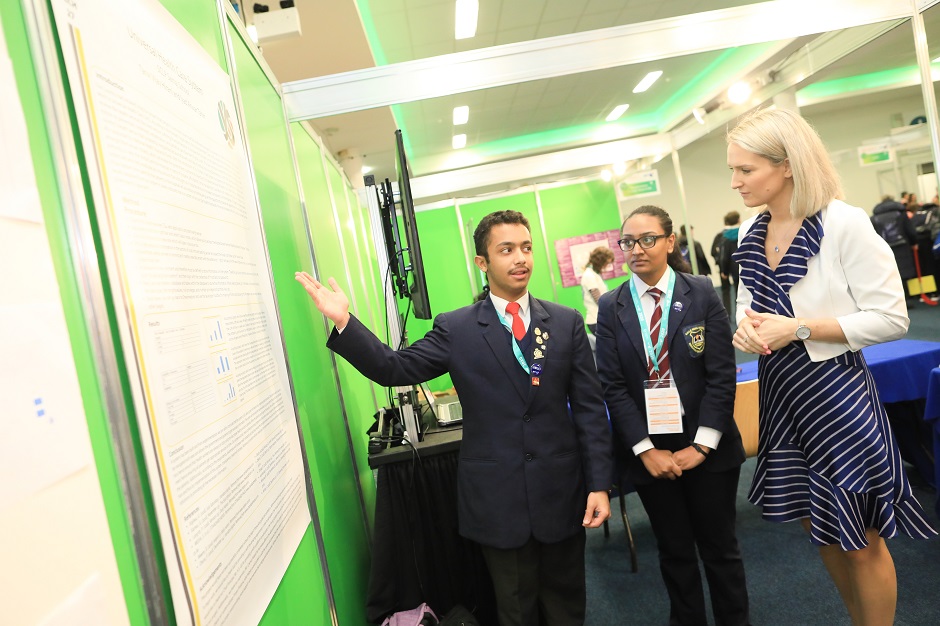
Tanvi and Iyad present their project to Minister Helen McEntee (Credit: Julien Behal Photography)
The winners of Young Scientists Kenya 2019 travelled to Ireland to present at BTYSTE. Iyad Anwar Taher and Tanvi Vijay Hirani from Nairobi, presented their project on the Universal Health Care System. Many Irish students were also concerned with improving health care in the Global South, particularly in rural communities. Students from Colaiste an Phiarsaigh, Cork, developed a sustainably powered dry heat steriliser for medical utensils to be used in rural communities where electricity might not be available or reliable. The solar-powered device is designed to sterilise equipment overnight without the need for chemicals or electricity. The Cork students came third in the Senior Group technology category for the project.
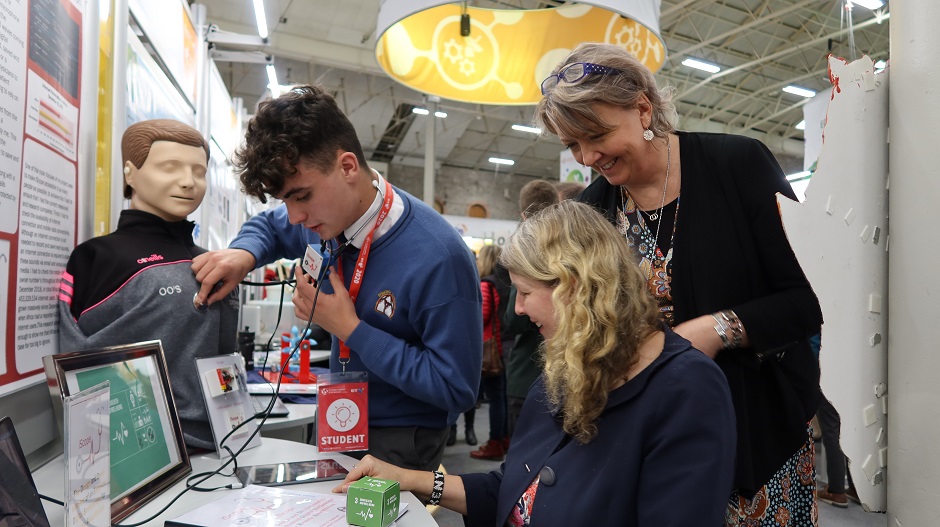
Oisín demonstrates his project to Áine Doody and Orla McBreen of Irish Aid (Credit: Orrin Moore)
Oisín O’Sullivan from Desmond College in Limerick developed and demonstrated his iScope, an enhanced digital stethoscope for remote auscultation. This device would assist accurate diagnosis of illnesses, including Ebola, in remote clinics. Haleema Nasir from Coláiste Nano Nagle Limerick examined the prevention of chronic bronchitis through organic methods, here in Ireland but especially in the Global South.
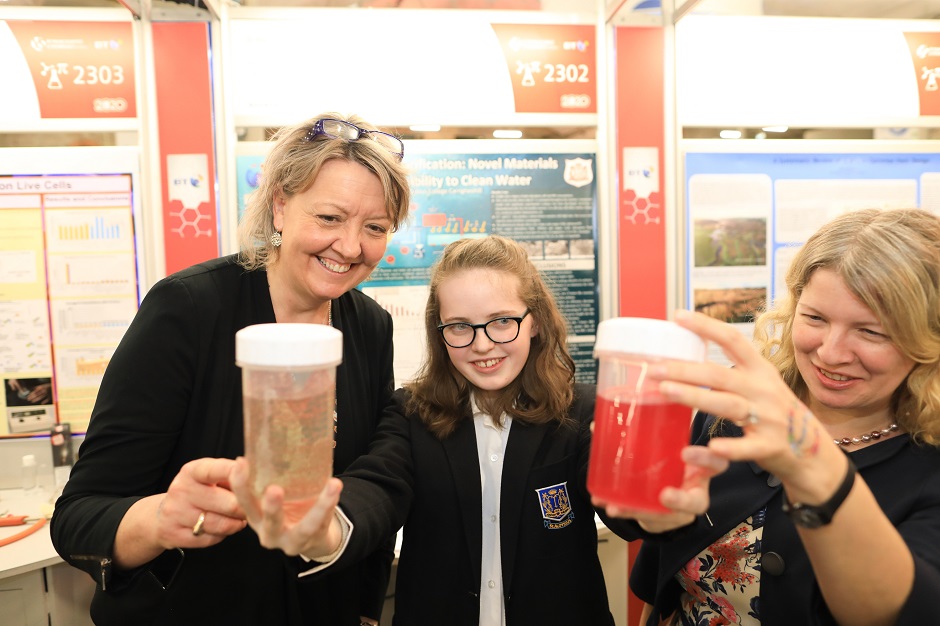
Aoife demonstrates her project to Áine Doody and Orla McBreen of Irish Aid (Credit: Julien Behal Photography)
Access to potable water which is clear of impurities, is already becoming a global issue, not least here in Ireland. There were many excellent projects which looked at ways to tackle this issue. Aoife Morris from St Aloysius College in Cork looked at phototactive water purification in her project called Novel Materials for Global Accessibility to Clean Water. Her project won her senior Individual first prize in Chemical, Physical and Mathematical Sciences, the CISCO Best Chemical, Physical and Mathematical Project and also the BT Educator of excellence to her teacher Angelina Carew in Senior Biological and Ecological. Yet another Cork student, Jeiden Sibi, from Pobalscoil na Tríonóide, Cork, investigated how commonly found seed pods, easily accessible in India and other countries could act as a natural coagulant for water treatment to purify water.
Students from Clonakilty Community College, Cork investigated the properties of coconut oil in desalinating water, which could prove very useful, not only in the Global South but worldwide. Students from South Eastern Regional College, Lisburn, investigated using chalk substances as a low cost water filtration system which might prove very useful in those countries. Leah Shaw, a Leaving Certificate student from Our Lady’s Bower, Athlone investigated whether citrus peels might provide the answer to global drought. Leah won the Trinity College Dublin Global Challenges award at Biological and Ecological, Senior level for her project.
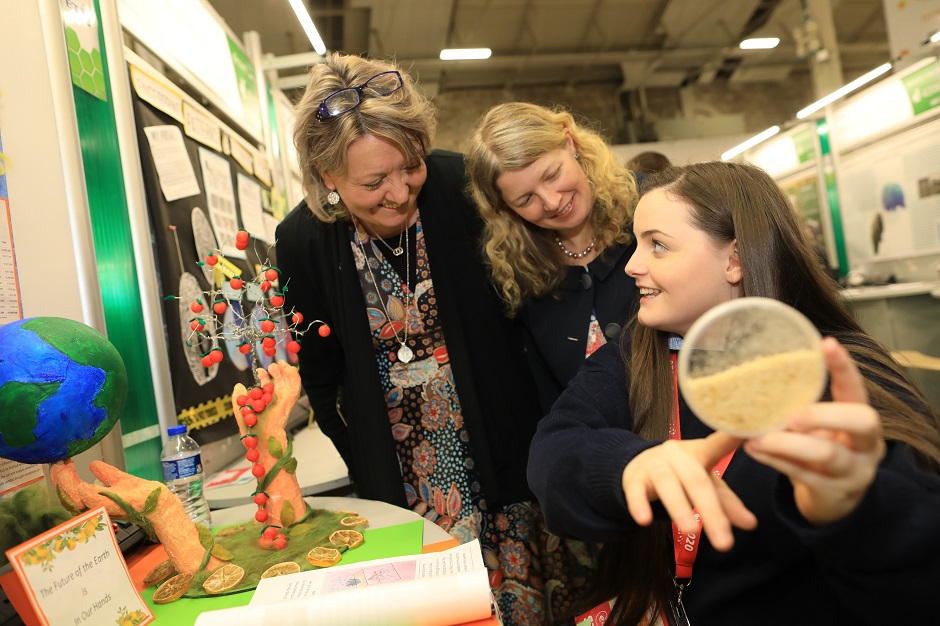
Leah demonstrates her project to Áine Doody and Orla McBreen of Irish Aid (Credit: Julien Behal Photography)
Anna O’Connor from St Angela’s College, Cork came third in the senior technology category with her project SPED (Solar Powered Educational Device) which focused on an easily maintained and affordable solar-powered school in a box to be used in areas with limited electricity.

